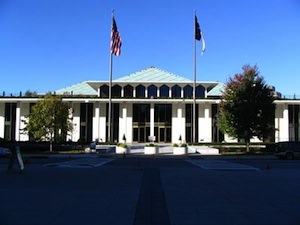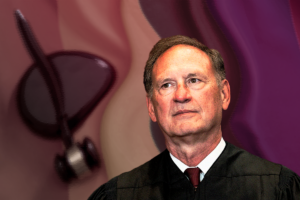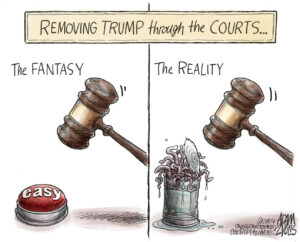N.C. GOP Lawmakers Want to Ignore Constitution, Establish Official State Religion
Ignoring the whole separation of church and state thing, a group of Republican legislators in North Carolina want to trample on your religious freedoms.
Ignoring the whole separation of church and state thing, a group of Republican legislators in North Carolina want to trample on your religious freedoms. On Monday, 11 state GOP lawmakers introduced a bill that would declare an official religion in the hopes of exempting their state from the Constitution and court rulings.
According to the group, the Constitution “does not grant the federal government and does not grant the federal courts the power to determine what is or is not constitutional.”
Here’s what the bill is proposing:
SECTION 1. The North Carolina General Assembly asserts that the Constitution of the United States of America does not prohibit states or their subsidiaries from making laws respecting an establishment of religion.
SECTION 2. The North Carolina General Assembly does not recognize federal court rulings which prohibit and otherwise regulate the State of North Carolina, its public schools, or any political subdivisions of the State from making laws respecting an establishment of religion.
Of course, there are a number of issues with this, chief among them being that it puts the lawmakers “at odds with over 200 years of constitutional law,” as Think Progress observed.
More from Think Progress:
This resolution is nothing less than an effort to repudiate the result of the Civil War. As the resolution correctly notes, the First Amendment merely provides that “Congress shall make no law respecting an establishment of religion,” and, indeed, the Bill of Rights was originally understood to only place limits on the federal government. For the earliest years of the Republic, the Bill of Rights were not really “rights” at all, but were instead guidelines on which powers belonged to central authorities and which ones remained exclusively in the hands of state lawmakers.
In 1868, however the Fourteenth Amendment was ratified for the express purpose of changing this balance of power. While the early Constitution envisioned “rights” as little more than a battle between central and local government, the Fourteenth Amendment ushered in a more modern understanding. Under this amendment, “[n]o State shall make or enforce any law which shall abridge the privileges or immunities of citizens of the United States,” nor may any state “deprive any person of life, liberty, or property, without due process of law.” The Fourteenth Amendment completely transformed the nature of the American Republic, from one where liberties were generally protected — if at all — by tensions between competing governments to one which recognized that there are certain liberties that cannot be abridged by any government.
There is some academic debate about whether the architects of the Fourteenth Amendment intended the freedoms protected by the Bill of Rights to be applied to the states because these liberties are part of the “privileges or immunities” of U.S. citizens, or because they are liberties that cannot be denied under the Constitution’s “due process” guarantees. Regardless of the correct answer to this academic question, however, one of the most important judicial projects of the Twentieth Century was a series of Supreme Court decisions applying most of the Bill of Rights’ limits to state governments. This project completed the work the framers of the Fourteenth Amendment began nearly 150 year ago — reconstructing America as a nation that recognizes certain civil rights which no lawmaker is allowed to trample. The right to be free from government endorsements of religious is one of these civil rights.
— Posted by Tracy Bloom.
Your support matters…Independent journalism is under threat and overshadowed by heavily funded mainstream media.
You can help level the playing field. Become a member.
Your tax-deductible contribution keeps us digging beneath the headlines to give you thought-provoking, investigative reporting and analysis that unearths what's really happening- without compromise.
Give today to support our courageous, independent journalists.






You need to be a supporter to comment.
There are currently no responses to this article.
Be the first to respond.